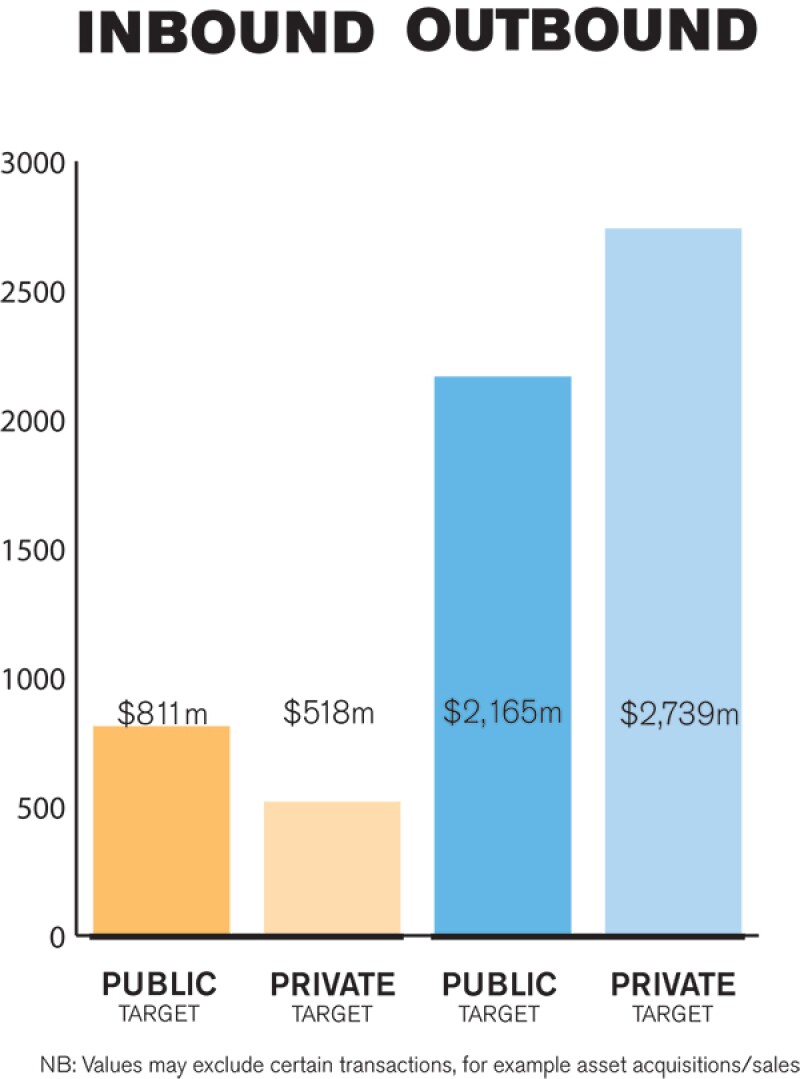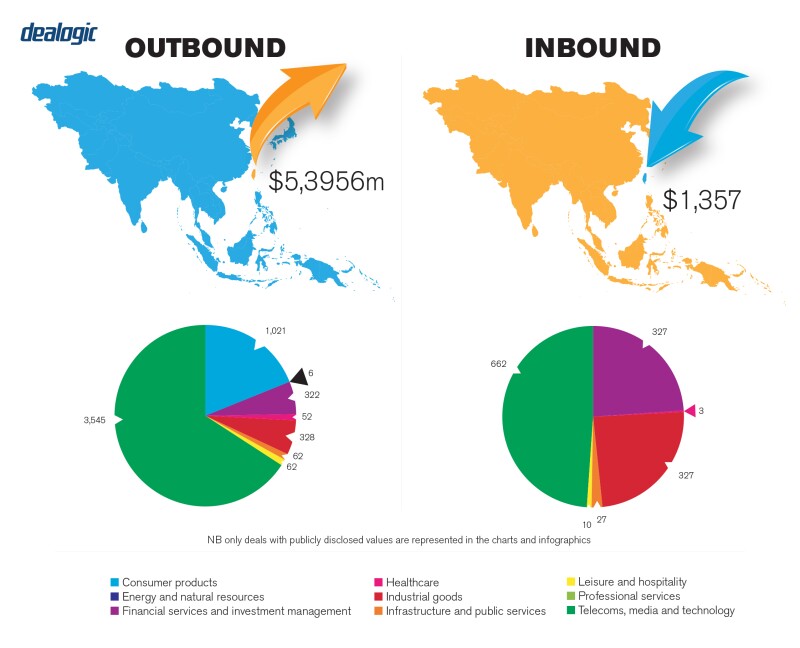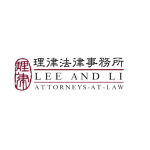Compared to 2018, 2019 was a relatively modest year for M&A in Taiwan. However, there were still some significant transactions in different sectors, including hostile takeovers and transactions in the energy sector.
There were two notable hostile M&A transactions in 2019. One was WPG Holdings' (WPG) investment in up to 30% of the shares of WT Microelectronics via a tender offer, valued at $270 million (NT$45.8 per share). WPG and WT Microelectronics are the leading semiconductor distributors in the Asia-Pacific region. WPG's investment in WT Microelectronics' shares drew the public's attention not only because it was one of the highest-profile deals in 2019 due to both WPG's and WT Microelectronics' listing on the Taiwan Stock Exchange (TWSE), and the large number of shareholders, but also because WT Microelectronics protested against WPG's hostile move intensively by claiming that the proposed acquisition requires the filing of a combination notification with the Taiwan Fair Trade Commission (TFTC). This transaction led to a heated discussion on whether WPG should submit a combination notification to the TFTC and obtain a clearance prior to the completion of the tender offer. Finally, the TFTC announced that this transaction did not require the filing of a combination notification.
Another notable deal was Hitachi's acquisition of the shares in Yung Tay Engineering, an elevator and escalator manufacturer listed on the TWSE. Hitachi, a Tokyo Stock Exchange-listed Japanese company, launched a tender offer through its Taiwanese SPV to acquire substantially all of Yung Tay's outstanding shares. During the process, the independent director raised concerns regarding the acquisition, challenging, among other things, the fairness of the price and the fiduciary duty of the incumbent directors. The independent director called an EGM to re-elect the incumbent directors, on which Hitachi applied for, but failed to obtain, a preliminary injunction to prohibit the convention of EGM. After the acquisition, Hitachi group holds approximately 39.7% of the outstanding shares of Yung Tay. While Hitachi did not obtain a majority of stake, Hitachi became the largest shareholder of Yung Tay after the acquisition. Yung Tay remains listed on the TWSE.
Continuing the momentum at end of 2018, another trend is the emergence of activity in the renewable energy sector, which parallels the Taiwanese government's policy to promote green energy. In addition to several major exits by the investors of the offshore wind project companies in 2019, there were also various acquisition projects involving large and small-scale solar energy plants. We expect this trend will continue in 2020.
As indicated above, there were fewer M&A transactions in 2019 than in 2018 and the total value of the transactions decreased by $6.65 billion. According to Bloomberg's M&A Legal League Table Rankings, the total value of announced deals in 2018 was $18.86 billion with a deal count of 231, while the total value of announced transactions in 2019 was $12.21 billion, with a deal count of 197. It is expected that M&A in 2020 will mainly follow the 2019 pace.
Both private and public M&A transactions drive the M&A market in Taiwan. While there were a few notable public M&A transactions in 2018 and 2019, there have been quite a few private M&A transactions in the market as well. For example, there have been several acquisitions in the energy sectors, and smaller M&A deals for emerging technology companies. There may have been fewer investments by PRC/PRC-invested companies in Taiwanese companies through M&A due to the change of political climate and the sensitive cross-strait situation.
TRANSACTION STRUCTURES
There have been several driving forces in the structuring of M&A deals in Taiwan. For example, given that the newly amended M&A Act (2016) allows for more flexibility in terms of the form of the consideration that an acquirer may offer to the shareholders of a target company, it should be easier for an acquirer to achieve a 100% equity interest acquisition. This was evidenced by the increasingly popular cash-out share exchange structure (in 2017 and 2018). In 2019, the slowing down of major transactions appears to reflect public calls for more stringent disclosure and voting requirements for cash-out deals and de-listings. Meanwhile, given the sensitivity of PRC investments in Taiwan, acquirers and targets are also spending more time structuring their transactions to meet local restrictions/requirements regarding PRC investment, as well as their commercial goals.
|
|
The newly amended M&A Act (2016) allows for more flexibility in terms of the form of the consideration that an acquirer may offer |
|
|
During the last decade, big-ticket M&A in Taiwan has been mostly driven by strategic investors. Financial investors have usually participated in M&A as co-investors or as acquirers of minority stakes in companies. In 2018 however, there was a boom in financial investors returning to the market after being silent for almost a decade. A series of deals, including KKR's take-private acquisition of LCY, Morgan Stanley's take-private acquisition of Microlife, Blackrock's acquisition of a solar portfolio from J&V Energy Technology and Permira's investment into aquaculture company Grobest, were all led by private equity funds. We did not see this trend of financial investment continuing into 2019, where the major transactions were again led by strategic investors.
Following KKR's take-private of LCY (a TWSE-listed company with a large number of shareholders) via a cash-out share exchange in 2018, there have since been recommendations for more stringent disclosure and voting requirements for cash-out deals and de-listings. Interpretation No. 770 was rendered by the Justices of the Constitutional Court in November 2018 as regards the concerns with the inadequacy of certain provisions on disclosure under the M&A Act. Several government agencies have launched initiatives to refine and amend the regulatory scheme for cash-out and delisting transactions in 2019, while none of which has been formally settled and put into practice.
Following the LCY and Microlife transactions of 2018, which seem to signal an increasing tendency for public companies to go private, we observed a trend in 2019 for hostile takeovers of public companies through tender offers. Examples include Hitachi's tender offer of Yung Tay and the tender offer by WPG to acquire shares of its peer WT Microelectronics. Both acquirers are strategic acquirers, but they ended up with only non-controlling stakes in their targets. This result could potentially be attributed to the calls for extra protection of minority shareholders. A drop in the number of mega deals could also reflect the investors being more cautious about minority shareholders' protection in view of the attitude of the competent authorities and the uncertainty with respect to the upcoming legislative change.

LEGISLATION AND POLICY CHANGES
The main statutes governing M&A activity in Taiwan are the M&A Act, the Company Act, the Securities and Exchange Act and the Fair Trade Act. In addition, under the Securities and Exchange Act, a set of tender offer rules are prescribed to govern tender offers of public companies. Other statutes may also be relevant, for example the Labour Standards Act, foreign and PRC investment regulations and tax laws and regulations.
The main regulatory body in charge of public M&A transactions is the Securities Futures Bureau (SFB) of the Financial Supervisory Commission (FSC), which is the government agency responsible for public companies. The other relevant regulatory bodies include the Fair Trade Commission (FTC), the authority in charge of anti-trust clearance, and the Investment Commission (IC), the authority in charge of reviewing foreign and PRC investments. If the target holds any special licence, the authority in charge of that special licence may also need to review the transaction.
After the latest amendments to the Company Act took effect in November 2018, shareholders holding over 50% of shares are permitted to call a shareholders' meeting, without needing the board to call such meeting. This allows insurgent shareholders to replace the incumbent board as soon as the insurgent shareholders acquire a majority stake. This is worth noting for hostile takeovers.
In November 2018, the Justices of the Constitutional Court granted a minority shareholder in a cash-out merger in 2007 an appraisal right in Interpretation No. 770, on the basis that the then effective M&A Act failed to afford sufficient protection in a cash-out merger and was therefore unconstitutional. The Justices of the Constitutional Court further opined that the current M&A Act (in effect since 2015) is also flawed in terms of shareholder protection, including with regards to disclosure requirements. Public comment on this Constitutional Court interpretation is that the validity of the current M&A Act is not immediately affected. On the other hand, the competent authority is expected to amend the current M&A Act in response to the Constitutional Court's concerns, including potentially raising the EGM voting threshold for de-listing, thereby affording the minority shareholders with more protection.
The government has also proposed to amend the Statute for Investment by Foreign Nationals, which governs foreign investments, by replacing the current prior approval system with a post-closing notification system for deals under a certain size. The proposed amendment also aims to shorten the foreign investment review process. By and large, the proposed amendment is expected to be friendlier to cross-border M&A deals; however, there is no definitive timeline for the legislative process.
MARKET NORMS
Information disclosure and insider trading are important and sensitive areas for public companies in Taiwan. However, local management sometimes underestimates their importance and fails to make the proper disclosures. In many instances, large public M&A transactions crossed red lines as regards insider trading and quite a few criminal investigations have been launched. There have been many attempts to manipulate the stock prices of listed companies, or to intentionally buy/sell the shares of the target company by the management before the information is legally and properly disclosed to the market in order to reap improper gains. A few notable deals in 2018 and 2019 were reported to have involved insider trading issues.
This type of misconduct harms the buyer's trust and if, for example, the price goes up unreasonably before the information disclosure, the buyer might ask for a cooling-down period or even choose to halt the transaction. Public companies therefore need to pay more attention to information disclosure when they plan M&A transactions. This includes understanding what information should be disclosed and the proper timing for disclosing certain pieces of information to the market. Most important of all, public company insiders should not trade any shares in the public company before proper information disclosure. Professional advice should be sought regarding this issue.
In Taiwan, M&A transactions are often subject to regulatory approvals, such as foreign investment approvals or PRC investment approvals. For those industries that are required to hold a special licence/permit, such as banking, securities firms, insurance companies, and so on, approval from the competent authority, such as the FSC, needs to be obtained in advance. Meanwhile, any M&A transaction triggering the pre-closing antitrust filing threshold needs to obtain antitrust clearance before closing. Given all these requirements, whether and how regulatory approvals can be smoothly obtained is a critical issue to the completion of an M&A transaction in Taiwan. As such, it is advisable that investors intending to conduct an M&A transaction in Taiwan seek professional assistance in advance, in order to better understand the regulatory requirements and application process.
In Taiwan, there has also been some discussion regarding how new technologies, such as artificial intelligence (AI), could support legal practice, including M&A transactions. However, these new technologies are still not commonly seen in Taiwan in M&A.

PUBLIC M&A
Given that under the Taiwan Company Act material decisions require the approval from shareholders holding two-thirds of the voting shares of a company, in order to gain an absolute control of a public company an acquirer should aim to acquire or control at least 67% of the shares. In practice, given that not all shareholders attend shareholder meetings, to control the management or operation of a listed company, it is sometimes enough for one investor to control 30% to 40% of the voting rights in a listed company. In sum, this would largely depend on the shareholding structure of the listed company.
In local practice, the conditions of a tender offer usually include the minimum and maximum number of shares that the shareholders of the target company agree to tender during the tender offer period; the tender offeror obtaining the required government approvals, if any (such as antitrust clearance and foreign investment approval, for example); and no occurrence of any material adverse event (subject to the approval of the FSC). After the XPEC case, the FSC amended the relevant tender offer regulations in 2016 to increase scrutiny and enhance transparency in tender offers. Specifically, under the amended tender offer regulations, a tender offeror must prove its ability to pay the tender offer consideration. Such proof can be in the form of either a bank guarantee, a report from an independent financial adviser or a certified public accountant (CPA) attesting to the offeror's ability to pay the tender offer consideration.
In terms of tender offers and other types of M&A transactions between public companies, we have rarely seen break fee arrangements.
PRIVATE M&A
Large private M&A transactions often adopt a completion accounts mechanism under which the purchase price is adjusted in accordance with the post-closing audit of the financial status of the target company, as at closing date. For transactions with a smaller value, it is more common for the parties to adopt the locked-box mechanism, which has become increasingly popular in recent years. Earn-out mechanisms and escrow arrangements are commonly seen in private M&A transactions.
The customary closing conditions attached to a private takeover offer usually include, among others, that the seller's representations and warranties remain true and correct; that the required government approval (if any) has been obtained; that required third party consent (if any) has been obtained; that no material adverse event has occurred; that no action or government order is seeking to deter or enjoin the proposed M&A transaction; and that other commercial arrangements required by the parties have been completed or achieved (this would usually be structured based on the due diligence findings).
If any party in a private M&A transaction belongs to a foreign corporate group, that party would normally require that the transaction documents be governed by the law of the foreign country where the headquarters of the foreign corporate group is located. Any dispute arising from the transaction documents will then be resolved via the court of a foreign jurisdiction or an arbitration proceeding conducted outside Taiwan. Local parties would normally accept such arrangements.
|
|
For transactions with a smaller value, it is more common for the parties to adopt the locked-box mechanism |
|
|
Warranty and indemnity (W&I) insurance seems to be a good way for the seller and buyer to allocate their respective risks in an M&A transaction. In local practice, W&I insurance has become more and more popular recently. Our observation is that, generally speaking, local practitioners now already have sufficient knowledge about W&I insurance and may introduce and recommend clients (especially sellers) to seek such insurance coverage for M&A transactions where appropriate.
The IPO market in Taiwan is generally perceived as serving the purpose of fund-raising rather than exiting, due to lock-up requirements, minimum shareholding requirements, legal requirements and limitations on selling shares that are applied to major shareholders, directors and supervisors. For the major shareholders of a public company that wish to sell their shares to a potential buyer, a mandatory tender offer may be triggered if more than 20% of the shareholding will be transferred within 50 days. Consequently, major shareholders' exit in the open market may be treated as a trade sale. In recent years, due to the low PE ratio of the Taiwan stock market and the strong performance of other stock exchanges in Asia (such as Shanghai Stock Exchange), the Taiwanese IPO market has been slow. This is another reason why major shareholders usually would not consider a Taiwanese IPO as an exit priority.
On the other hand, trade sales or sales to financial sponsors have always been a major exit route. Other than highly regulated industries (such as media or cable TV) or acquisitions involving PRC funding, there should be no substantial hurdle for an exit, albeit that the regulatory approval process may sometimes take a long time. As for highly regulated industries and investments involving PRC funding, the Taiwanese government has been criticised for the prolonged regulatory approval process and lack of transparency in its decision-making process.
In addition to the above, generally speaking applications for foreign investments in Taiwan (including application for initial investment in Taiwan or subsequent application for sale/exit in M&A projects) seem to have become more difficult, compared to several years ago, due to the government's concern about ultimate beneficial owner(s) of the foreign investor(s) being from the PRC. Due to these concerns, the competent authorities tend to ask the applicant to submit more information in order to verify the identity and background of the beneficial owners. The entire process could become more time-consuming. It is also likely that the competent authorities might reject an application due to factors such as national security.
LOOKING AHEAD
In line with the government policy and global trends, as well as a local movement pushing for disinvestment in nuclear energy, we expect that M&A will continue to thrive in the renewable energy sector despite recent setbacks due to the decrease in the applicable tariff rate for the sale of wind power.
Meanwhile, considering the current government's conservative attitude toward PRC investment, and due to the sensitivity of the cross-strait relationship, we do not expect major transactions involving PRC funding taking place in Taiwan. However, it is anticipated that there will be more inquiries regarding so-called VIE structures or other alternative structures to achieve collaboration between PRC investors and Taiwan companies.
One trend that investors must not overlook is that the Taiwanese authorities tend to take a more and more stringent position towards foreign investors' investment/divestment projects in Taiwan. The review process of competent authorities, in terms of the detail of information they require and review timelines, is becoming more and more complicated and time-consuming.
Lawyers will need to pay more attention in planning cross-border M&A transactions in terms of coordinating legal requirements between different jurisdictions and, more importantly, whether and how the various required government approvals can be obtained.
About the author |
||

|
|
Yvonne Hsieh Senior counsellor, Lee and Li Attorneys-at-Law Taipei, Taiwan T: +886-2-2763-8000 ext. 2188 Yvonne Hsieh is a senior counsellor at Lee and Li. Her practice focuses on M&A, international investment, securities and antitrust. She has assisted many foreign companies in acquiring and privatising listed companies, including the recent acquisition of a Taiwan chemical company conducted by a private equity fund. Yvonne is also an expert on antitrust and has been recognised as being among the world's leading competition lawyers since 2013 by Who's Who Legal. |
About the author |
||

|
|
Eddie Chan Partner, Lee and Li Attorneys-at-Law Taipei City, Taiwan T: +886 2 2763 8000 ext. 2139 Eddie Chan is a partner at Lee and Li and currently co-leads the firm's M&A practice group. He has exposure to a wide range of clients from different industries and provides advice on various complex acquisitions. Chan is also specialised in PRC investment projects in Taiwan. He recently advised private and state-owned PRC companies on investment projects in Taiwan. |
About the author |
||

|
|
Patricia Lin Senior counsellor, Lee and Li Attorneys-at-Law Taipei, Taiwan T: + 886 2-2763 8000 ext.2235 Patricia Lin is a senior counsellor at Lee and Li. Her practice focuses on banking, securities, capital market, financings (particularly, structured and aircraft financing) and M&A. Patricia has worked on many international capital market offerings (DRs, ECBs and Formosa bonds). She is an M&A expert in both general and highly regulated financial and telecom industries. She advised the first PRC investment in LED industry. |
About the author |
||

|
|
Cheng-Chieh Huang (James) Partner, Lee and Li Attorneys-at-Law Taipei, Taiwan T: +886 2 2763 8000 ext.2157 James Huang is a partner at the banking and capital market department of Lee and Li, with principal practice areas in banking, capital market and M&A. James has represented clients in various high profiles M&A transactions. He also advises local and international banks, securities firms, insurance companies, financial holding companies and other financial institutions on drafting and review of relevant transaction documents, regulatory compliance issues and applications and permits for relevant business. He also has extensive experience in syndicated loans, acquisition finance, project finance, mortgaged loan securitisation, and disposals of non-performing loans by financial institutions. |





